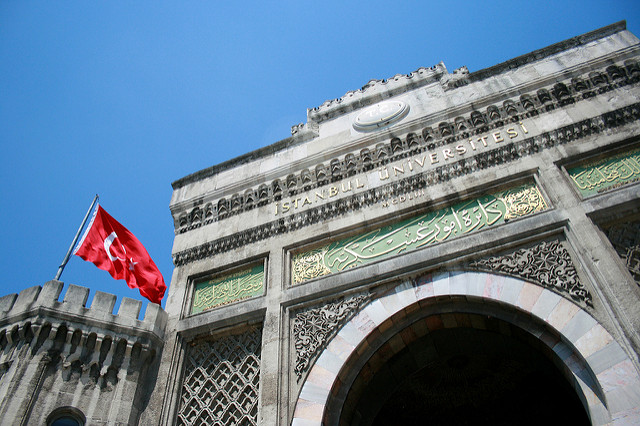19 Sep 2016 | Magazine, Magazine Contents, mobile, Volume 45.03 Autumn 2016
[vc_row][vc_column][vc_custom_heading text=”Does anonymity need to be defended? Contributors include Hilary Mantel, Can Dündar, Valerie Plame Wilson, Julian Baggini, Alejandro Jodorowsky and Maria Stepanova “][vc_row_inner][vc_column_inner width=”1/2”][vc_column_text]
The latest issue of Index on Censorship explores anonymity through a range of in-depth features, interviews and illustrations from around the world. The special report looks at the pros and cons of masking identities from the perspective of a variety of players, from online trolls to intelligence agencies, whistleblowers, activists, artists, journalists, bloggers and fixers.
[/vc_column_text][/vc_column_inner][vc_column_inner width=”1/2″][vc_single_image image=”78078″ img_size=”full”][/vc_column_inner][/vc_row_inner][vc_column_text]
Former CIA agent Valerie Plame Wilson writes on the damage done when her cover was blown, journalist John Lloyd looks at how terrorist attacks have affected surveillance needs worldwide, Bangladeshi blogger Ananya Azad explains why he was forced into exile after violent attacks on secular writers, philosopher Julian Baggini looks at the power of literary aliases through the ages, Edward Lucas shares The Economist’s perspective on keeping its writers unnamed, John Crace imagines a meeting at Trolls Anonymous, and Caroline Lees looks at how local journalists, or fixers, can be endangered, or even killed, when they are revealed to be working with foreign news companies. There are are also features on how Turkish artists moonlight under pseudonyms to stay safe, how Chinese artists are being forced to exhibit their works in secret, and an interview with Los Angeles street artist Skid Robot.
Outside of the themed report, this issue also has a thoughtful essay by novelist Hilary Mantel, called Blot, Erase, Delete, about the importance of committing to your words, whether you’re a student, an author, or a politician campaigner in the Brexit referendum. Andrey Arkhangelsky looks back at the last 10 years of Russian journalism, in the decade after the murder of investigative reporter Anna Politkovskaya. Uzbek writer Hamid Ismailov looks at how metaphor has taken over post-Soviet literature and prevented it tackling reality head-on. Plus there is poetry from Chilean-French director Alejandro Jodorowsky and Russian writer Maria Stepanova, plus new fiction from Turkey and Egypt, via Kaya Genç and Basma Abdel Aziz.
There is art work from Molly Crabapple, Martin Rowson, Ben Jennings, Rebel Pepper, Eva Bee, Brian John Spencer and Sam Darlow.
You can order your copy here, or take out a digital subscription via Exact Editions. Copies are also available at the BFI, the Serpentine Gallery, MagCulture, (London), News from Nowhere (Liverpool), Home (Manchester), Calton Books (Glasgow) and on Amazon. Each magazine sale helps Index on Censorship continue its fight for free expression worldwide.
Index on Censorship magazine was started in 1972 and remains the only global magazine dedicated to free expression. Past contributors include Samuel Beckett, Gabriel García Marquéz, Nadine Gordimer, Arthur Miller, Salman Rushdie, Margaret Atwood, and many more.
[/vc_column_text][/vc_column][/vc_row][vc_row][vc_column][vc_custom_heading text=”SPECIAL REPORT: THE UNNAMED” css=”.vc_custom_1483445324823{margin-right: 0px !important;margin-left: 0px !important;border-bottom-width: 1px !important;padding-top: 15px !important;padding-bottom: 15px !important;border-bottom-color: #455560 !important;border-bottom-style: solid !important;}”][vc_column_text]
Does anonymity need to be defended?
Anonymity: worth defending, by Rachael Jolley: False names can be used by the unscrupulous but the right to anonymity needs to be defended
Under the wires, by Caroline Lees : A look at local “fixers”, who help foreign correspondents on the ground, can face death threats and accusations of being spies after working for international media
Art attack, by Jemimah Steinfeld: Ai Weiwei and other artists have increased the popularity of Chinese art, but censorship has followed
Naming names, by Suhrith Parthasarathy: India has promised to crack down on online trolls, but the right to anonymity is also threatened
Secrets and spies, by Valerie Plame Wilson: The former CIA officer on why intelligence agents need to operate undercover, and on the damage done when her cover was blown in a Bush administration scandal
Undercover artist, by Jan Fox: Los Angeles street artist Skid Robot explains why his down-and-out murals never carry his real name
A meeting at Trolls Anonymous, by John Crace: A humorous sketch imagining what would happen if vicious online commentators met face to face
Whose name is on the frame? By Kaya Genç: Why artists in Turkey have adopted alter egos to hide their more political and provocative works
Spooks and sceptics, by John Lloyd: After a series of worldwide terrorist attacks, the public must decide what surveillance it is willing to accept
Privacy and encryption, by Bethany Horne: An interview with human rights researcher Jennifer Schulte on how she protects herself in the field
“I have a name”, by Ananya Azad: A Bangladeshi blogger speaks out on why he made his identity known and how this put his life in danger
The smear factor, by Rupert Myers: The power of anonymous allegations to affect democracy, justice and the political system
Stripsearch cartoon, by Martin Rowson: When a whistleblower gets caught …
Signing off, by Julian Baggini: From Kierkegaard to JK Rowling, a look at the history of literary pen names and their impact
The Snowden effect, by Charlie Smith: Three years after Edward Snowden’s mass-surveillance leaks, does the public care how they are watched?
Leave no trace, by Mark Frary: Five ways to increase your privacy when browsing online
Goodbye to the byline, by Edward Lucas: A senior editor at The Economist explains why the publication does not name its writers in print
What’s your emergency? By Jason DaPonte: How online threats can lead to armed police at your door
Yakety yak (don’t hate back), by Sean Vannata: How a social network promising anonymity for users backtracked after being banned on US campuses
[/vc_column_text][/vc_column][/vc_row][vc_row][vc_column][vc_custom_heading text=”IN FOCUS” css=”.vc_custom_1481731813613{margin-right: 0px !important;margin-left: 0px !important;border-bottom-width: 1px !important;padding-top: 15px !important;padding-bottom: 15px !important;border-bottom-color: #455560 !important;border-bottom-style: solid !important;}”][vc_column_text]
Blot, erase, delete, by Hilary Mantel: How the author found her voice and why all writers should resist the urge to change their past words
Murder in Moscow: Anna’s legacy, by Andrey Arkhangelsky: Ten years after investigative reporter Anna Politkovskaya was killed, where is Russian journalism today?
Writing in riddles, by Hamid Ismailov: Too much metaphor has restricted post-Soviet literature
Owners of our own words, by Irene Caselli: Aftermath of a brutal attack on an Argentinian newspaper
Sackings, South Africa and silence, by Natasha Joseph: What is the future for public broadcasting in southern Africa after the sackings of SABC reporters?
“Journalists must not feel alone”, by Can Dündar: An exiled Turkish editor on the need to collaborate internationally so investigations can cross borders
[/vc_column_text][/vc_column][/vc_row][vc_row][vc_column][vc_custom_heading text=”CULTURE” css=”.vc_custom_1481731777861{margin-right: 0px !important;margin-left: 0px !important;border-bottom-width: 1px !important;padding-top: 15px !important;padding-bottom: 15px !important;border-bottom-color: #455560 !important;border-bottom-style: solid !important;}”][vc_column_text]
Bottled-up messages, by Basma Abdel Aziz: A short story from Egypt about a woman feeling trapped. Interview with the author by Charlotte Bailey
Muscovite memories, by Maria Stepanova: A poem inspired by the last decade in Putin’s Russia
Silence is not golden, by Alejandro Jodorowsky: An exclusive translation of the Chilean-French film director’s poem What One Must Not Silence
Write man for the job, by Kaya Genç: A new short story about a failed writer who gets a job policing the words of dissidents in Turkey
[/vc_column_text][/vc_column][/vc_row][vc_row][vc_column][vc_custom_heading text=”COLUMNS” css=”.vc_custom_1481732124093{margin-right: 0px !important;margin-left: 0px !important;border-bottom-width: 1px !important;padding-top: 15px !important;padding-bottom: 15px !important;border-bottom-color: #455560 !important;border-bottom-style: solid !important;}”][vc_column_text]
Global view, by Jodie Ginsberg: Europe’s right-to-be-forgotten law pushed to new extremes after a Belgian court rules that individuals can force newspapers to edit archive articles
Index around the world, by
Josie Timms: Rounding up Index’s recent work, from a hip-hop conference to the latest from Mapping Media Freedom
[/vc_column_text][/vc_column][/vc_row][vc_row][vc_column][vc_custom_heading text=”END NOTE” css=”.vc_custom_1481880278935{margin-right: 0px !important;margin-left: 0px !important;border-bottom-width: 1px !important;padding-top: 15px !important;padding-bottom: 15px !important;border-bottom-color: #455560 !important;border-bottom-style: solid !important;}”][vc_column_text]
What ever happened to Luther Blissett? By Vicky Baker: How Italian activists took the name of an unsuspecting English footballer, and still use it today
[/vc_column_text][/vc_column][/vc_row][vc_row][vc_column][vc_custom_heading text=”SUBSCRIBE” css=”.vc_custom_1481736449684{margin-right: 0px !important;margin-left: 0px !important;border-bottom-width: 1px !important;padding-bottom: 15px !important;border-bottom-color: #455560 !important;border-bottom-style: solid !important;}”][vc_column_text]Index on Censorship magazine was started in 1972 and remains the only global magazine dedicated to free expression. Past contributors include Samuel Beckett, Gabriel García Marquéz, Nadine Gordimer, Arthur Miller, Salman Rushdie, Margaret Atwood, and many more.[/vc_column_text][vc_row_inner][vc_column_inner width=”1/2″][vc_single_image image=”76572″ img_size=”full”][/vc_column_inner][vc_column_inner width=”1/2″][vc_column_text]In print or online. Order a print edition here or take out a digital subscription via Exact Editions.
Copies are also available at the BFI, the Serpentine Gallery, MagCulture, (London), News from Nowhere (Liverpool), Home (Manchester), Calton Books (Glasgow) and on Amazon. Each magazine sale helps Index on Censorship continue its fight for free expression worldwide.
 SUBSCRIBE NOW[/vc_column_text][/vc_column_inner][/vc_row_inner][/vc_column][/vc_row][vc_row][vc_column][vc_basic_grid post_type=”post” max_items=”4″ element_width=”6″ grid_id=”vc_gid:1483444808560-b79f752f-ec25-7″ taxonomies=”8927″ exclude=”80882″][/vc_column][/vc_row]
SUBSCRIBE NOW[/vc_column_text][/vc_column_inner][/vc_row_inner][/vc_column][/vc_row][vc_row][vc_column][vc_basic_grid post_type=”post” max_items=”4″ element_width=”6″ grid_id=”vc_gid:1483444808560-b79f752f-ec25-7″ taxonomies=”8927″ exclude=”80882″][/vc_column][/vc_row]
24 Aug 2016 | mobile, News and features, Youth Board
Index recently appointed a new youth advisory board cohort. The eight young students and professionals, from countries including Hungary, Germany, India and the US, will hold their seats on the board until December.
Each month, board members meet online to discuss freedom of expression issues occurring around the world and complete an assignment that grows from that discussion. For their first task the board were asked to write a short bio and take a photo of themselves holding a quote that reflects their belief in free speech.
Sophia Smith-Galer 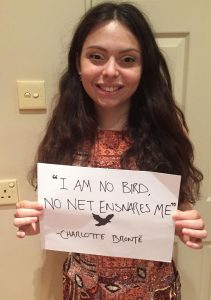
I’m half English, half Italian, and was born and raised in London. I have just graduated from Durham University with a degree in Spanish and Arabic and will be studying for a Master’s in broadcast journalism at City University next year.
I have just returned from a trip to New York after winning a multilingual world essay prize which included speaking at the United Nations’ General Assembly. I was in the group of Arabic language winners and our speeches were about tackling climate change, which is one of the UN’s sustainable development goals for 2030. Now that I am embarking on a career in journalism I’m looking forward to continue supporting these goals in my work.
Freedom of expression is particularly important to me as several countries that speak both of the languages I have dedicated years of study to continue to be plagued by tyrants and censors. I’m particularly interested addressing censorship in Latin America and the Middle East, especially with regard to the arts, as I’m also a classical singer and keen art historian.
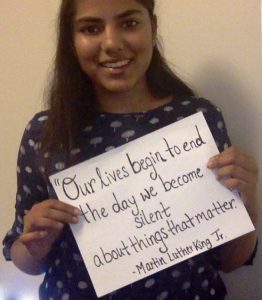
Shruti Venkatraman
Originally from Mumbai, I am currently a first year undergraduate studying law at the University of Edinburgh. As a law student, I am interested in advocacy in general, but I am particularly interested in advocating for fundamental human rights.
In today’s socio-political context, the phrase “freedom of expression” has gained importance and expanded in its meaning from it’s original intent to prevent minority persecution. Having lived in India and South Africa, I was able to grasp the importance of free speech in the context of regional history, and I learnt how human rights appeals have had local and global impacts and are inherently tied with social development. Index on Censorship’s admirable work to promote and defend freedom of expression highlights how important this cause is in our quest for social progress, justice and equality and how repression of these rights result in societal backwardness.
Niharika Pandit 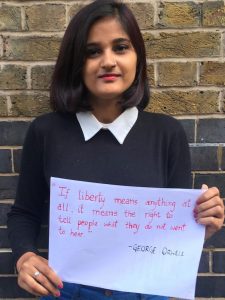
I am currently a master’s candidate at the Centre for Gender Studies at SOAS, University of London with South Asia as my focus area of gender research. I became interested in issues of censorship during my undergraduate studies in mass media with a specialisation in journalism from Bombay.
As a journalist and an active social media user in India, I was witness to numerous instances of online abuse, trolling and silencing of women politicians, journalists and activists who voiced opinions on political and social issues. As a response to the barrage of abuse in the online space, otherwise a liberating space to hear diversified opinions, I wrote a piece on Twitter trolls in India and the use of sexist abuse as a tool to muzzle women for Index on Censorship’s Young Writers’ Programme.
Within censorship, I am particularly interested in working on the intersections of social media, gender along with looking at censorship in militarised zones and its growing legitimacy in contemporary political ethos as part of my research.

Layli Foroudi
It was studying literary works from the Soviet period during my undergraduate degree that highlighted the issue of censorship for me initially. Clearly this issue has outlived (and predates) the Soviet Union and is still of pressing concern in Russia today and globally. After graduating, I worked as a journalist on issues of freedom of expression and belief in Iran, and then in Russia at the Moscow Times. By pushing a state-sponsored version of the truth and punishing those at variance with it, these countries and others marginalise people and stifle innovation and creativity.
Freedom of expression and public debate underpin what society consists of and being denied this freedom is being denied the right to participation in society, as Hannah Arendt wrote: the polis is “the organisation of people as it arises out of acting and speaking together”. Historically, many have been denied the right to “act and speak”, based on ethnicity, gender, belief, immigration status, etc, and continue to be. I am interested in encouraging a diversity voices in the public sphere, something I have enjoyed exploring more this past year while undertaking an MPhil in race, ethnicity, and conflict at Trinity College Dublin and as a member of the youth advisory board since January.
Ian Morse 
I’m a student and journalist at Lafayette College in the US, but I have studied in Germany, Turkey and the UK. I really started studying news media when I lived in Turkey 18 months ago, because even then (much more so now) journalists and bloggers had a very tough time gathering and publishing good information. Since then, I’ve been a journalist in Turkey, the UK and Greece. I study history and mathematics-economics, but almost every project I do is focused on news media.
I’ve encountered freedom of expression violations in many fashions, from student pressures against speakers to petty government retaliation to Twitter blocking. There is quite a bit of nuance that is overlooked in many cases, but that nuance is needed to understand where the line needs to be drawn. Words have a lot of power in society – but it is often difficult to get the truth out when lies are louder or gags are stronger. I hope with Index that we can find ways to fix this.
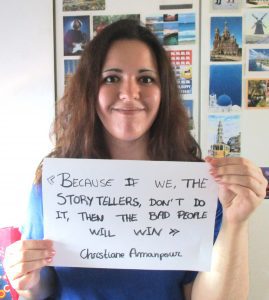
Anna Gumbau
I am a journalist living between Barcelona and Brussels. I am passionate about youth work, having volunteered for five years as member of AEGEE-Europe / European Students’ Forum, including a year as member of its international board. I have taken part in, and often led projects, run by students for other students all over Europe, on topics such as pluralism of media, election observation and media literacy. I am also involved in the field of internet governance, participating in the last two editions of the EuroDIG and joining the Youth Observatory of the Internet Society.
As a young media-maker who grew up listening to the stories of censorship in the times of the Spanish dictatorship, I believe strongly in free speech, a free press and media pluralism as essential pillars for democracy. I am fascinated by the power of words and freedom of expression to empower citizens and stand up to what they believe in. I also envision free media as a crucial element for better informed societies and, in extension, for more responsible individual citizens to participate in the public space.
Constantin Eckner 
I am originally from Germany. I graduated from University of St Andrews with a master’s degree in modern history. Currently, I am a Ph.D. candidate specialising in human rights, asylum policy and the history of migration. Moreover, I have worked as a writer and journalist since I was 17 years old, covering a variety of topics over the years. Longer stays in cities like Budapest and Istanbul have raised my awareness for pressures exerted upon freedom of expression.
In a perfect world journalists, as well as every citizen, would live without fear of state censorship and potentially facing repercussions for the words they write or speak, for the pictures they draw, for the photos they shoot or for music they play.
Freedom of expression and access to information are cornerstones of an enlightened society. Unfortunately, in 2016 the world is still challenged by undemocratic regimes and powers that intend to quash people, which is an oppressive situation that has to change. It is up to us to help those who cannot raise their voice fearlessly.
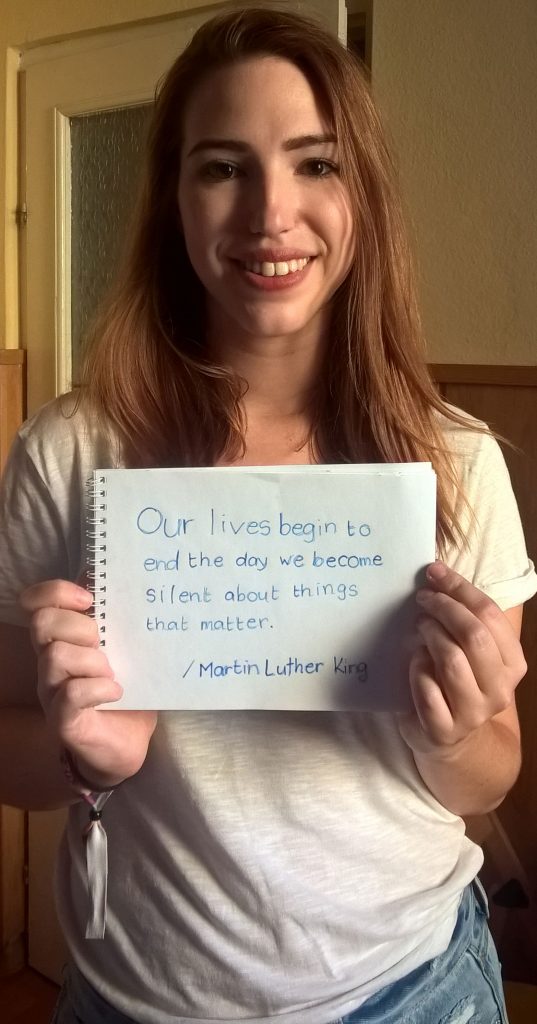 Fruzsina Katona
Fruzsina Katona
I was born and raised in Hungary, although I spent my pre-university years in a small town in eastern Hungary. Today I am a freelance journalist.
I always knew I wanted to be a journalist, since I was always interested in literally everything that surrounded me. The urge to publish became stronger at the age of 17, after I returned from Japan, where I spent a school year. That one year made me realise, that my home country is really far from the image I had of it. And the only way I can fight against corruption, abuses and narrow-mindedness – apart from voting – is to educate and inform the public. I took an internship at Hungary’s leading investigative journalism center, and 2015 Index on Censorship Freedom of Expression award-winner, Atlatszo.hu. I have worked for them as a freelancer ever since, and I enjoy my work pretty much.
I recently received a graduate degree in communication and media studies, and supplemented my “official” studies with training, workshops and conferences across Europe.
In the future I would like to be a post-conflict reporter or a human rights journalist, specialising in freedom of expression and the press.
10 Aug 2016 | Academic Freedom, Campaigns -- Featured, Europe and Central Asia, mobile, News and features, Turkey, Turkey Uncensored
The stream may be small right now, a trickle, but it is unmistakable. Turkey’s academics and secular elite are quietly and slowly making their way for the exits.
Some months ago, in the age before Turkey’s post-coup crushing of academia, a respected university lecturer told me she was seeking happiness outside Turkey. She was teaching economics at one of Istanbul’s major universities, but neither her nor her husband, who is also in the financial sector, had a desire to remain in the country any longer. They simply packed up and left for Canada.
The growing unease about the future is now accelerating among the academics and mainly secular elite in the country. This well-educated section of society is feeling the pressure more than any other, and as the instability mounts the urge to join the “brain drain” will only increase.
Some of them, particularly those academics who have been fired and those who now face judicial charges for signing a petition calling for a return to peace negotiations with the Kurdish PKK, no longer see a future for their careers. With the government further empowered by emergency rule decrees, the space for debate and unfettered learning is shrinking.
One of the petition’s signatories, the outspoken sociologist Dr Nil Mutluer, has already moved to a role at the well-respected Humboldt University in Berlin to teach in a programme devoted to scholars at risk.
You only have to look at the numbers to realise why more are likely to follow in the footsteps of those who have already left Turkey. In the days after the failed coup that struck at the country’s imperfect democracy, the government of president Recep Tayyip Erdogan swept 1,577 university deans from their posts. Academics who were travelling abroad were ordered to return to the country, while others were told they could not travel to conferences for the foreseeable future. Some foreign students have even been sent home. The pre-university educational system has been hit particularly hard: the education ministry axed 20,000 employees and 21,000 teachers working at private schools had their teaching licenses revoked.
Anyone with even the whiff of a connection to FETO — the Erdogan administration’s stalking horse for the parallel government supposedly backed by the Gulenist movement — is in the crosshairs. Journalists, professors, poets and independent thinkers who dare question the prevailing narrative dictated by the Justice and Development Party will hear a knock at the door.
It appears that the casualty of the coup will be the ability to debate, interrogate and speak about competing ideas. That’s the heart of academic freedom. The coup and the president’s reaction to it have ripped it from Turkey’s chest.
But it’s not just the academics who are starting to go. The secular elite and people of Kurdish descent that are also likely to vote with their feet.
Signs are, that those who are exposed to, or perceive, pressure, are already doing this. Scandinavian countries have noted an increase in the exodus of the Turkish citizens. Deutsche Welle’s Turkish news site reported that 1719 people sought asylum in Germany in the first half of this year. This number already equals the total of Turkish asylum seekers who registered during the whole of 2015. Not surprisingly, 1510 of applications in 2016 came from Kurds, who are under acute pressure from the government.
The secular (upper) middle class is also showing signs of moving out. The economic daily Dünya reported on Monday that the number of inquiries into purchasing homes abroad grew four-to-five times the pre-coup level. Many real estate agencies, the paper reported, are expanding their staff to meet the demand. Murat Uzun, representing Proje Beyaz firm, told Dünya:
“The demand is growing since July 15 by every day. Emergency rule has also pushed up the trend. These people are trying to buy a life abroad. Ten to twelve people visit our office every day….Many ask about the citizenship issues.”
Adnan Bozbey, of Coldwell Banker, told the paper that people were asking him: “Is Turkey becoming a Middle Eastern country?”
According to Dünya, the USA, Ireland, Portugal, Greece, Malta and Baltic countries are popular among those who want to seek life prospects elsewhere.
In short, the unrest is spreading. Unless the dust settles and the immense political maneuvering about the course Turkey is on reverses, it would be realistic to presume that a significant demographic shift will take place in the near future.
A version of this article originally appeared on Suddeutsche Zeitung. It is posted here with the permission of the author.

Turkey Uncensored is an Index on Censorship project to publish a series of articles from censored Turkish writers, artists and translators.
1 Aug 2016 | Europe and Central Asia, Mapping Media Freedom, mobile, News and features, Turkey, Turkey Uncensored

Turkish journalist Lale Kemal
It was a long Saturday night for all of us, at home and abroad, monitoring the worrisome developments around media freedom in Turkey. As if to confirm our fears, the night ended with the detention of six more journalists.
Defence lawyers expected the cases to be handled first thing Monday 1 August. But in a hasty move, journalists who wrote for the opinion section of Zaman — which stands at the epicentre of accusations of being part of the so-called “media leg of FETO terror organisation” — were taken to the Istanbul courthouse. After a long process, all were sent to jail.
The ruling, written under the extraordinary circumstances of emergency rule, reads like a severe restriction of the free word in particular and journalism in general.
The motivation for detention went, in a nutshell, that the six “prevented the investigation on the armed structure in their columns and via social media, and continued to write their columns even after the chief editor of Zaman daily, Ekrem Dumanlı, had fled the country”. Sigh.
There was no other mention than their expressed views — without going into any specifics in their content — and it was seen as sufficient by the judge to rule for jailing. Theirs will add to the pile of complaints from Turkey at the European Court of Human Rights.
It was the case of Şahin Alpay in particular which raised concerns among his colleagues in media and academia. One of the top liberal voices in Turkey, and known with respect among others in German social democrat, liberal and green political circles, Alpay is utterly frail with several health issues. The hopes of a release — albeit conditional — were high but crashed.
Yesterday, his family tried to contact him in prison, uncertain of any success.
All the six are from Turkish media’s liberal end of the spectrum. Among them are two female reporters that require attention. Lale Kemal, who was a commentator with Zaman, is an expert journalist on defence issues, with a long career. Her CV begins with Anatolian Agency, going on with Cumhuriyet daily, Hürriyet Daily News, Taraf and Today’s Zaman. She has been a stringer for Jane’s Defence Weekly for a long time.
The other, Nuriye Akman, has been a professional for 25 years. She worked with “mainstream” dailies in the 1990s and marked her reputation with long, Oriana Fallaci-style interviews both in print and TV. She is also the author of three novels.
Both women have been known to earn their keep only through journalism, like the others in this group of detainees.
Ali Bulaç, with a background as a theologue, is an independent voice within the conservative segments, often with disagreements and polemics with some others in the group. Ahmet Turan Alkan is regarded as a senior voice as part of the centre-right liberal flank in Turkey, popular for his ironic style. And Mustafa Ünal, who was Ankara Bureau Chief of Zaman, was for long active in Ankara, covering major political issues with a minimalist, simple writing style.
According to the regular monitoring done in daily basis by Platform for Independent Journalism (P24), these latest detentions mean that since the bloody coup attempt on July 15, 29 journalists are detained. In a total, there are now 62 journalists in jail in Turkey.
During the long, dark hours on Sunday, there was another message that added to the fears. A colleague, Ali Aslan, based in Washington DC, tweeted that the police had detained the wife of a journalist Bülent Korucu, former editor in chief of the weekly news magazine Aksiyon, now under arrest warrant but on the run. The police, Aslan claimed, threatened to keep her locked until her husband surrenders. Korucu’s son also confirmed this claim.
Dark Sunday indeed.
What fuels the concerns is that there is so far no assurance from the government about the respect for media freedom and whether or not the witch hunt will end anytime soon.
A version of this article originally appeared at Suddeutsche Zeitung. It is posted here with the permission of the author.

Turkey Uncensored is an Index on Censorship project to publish a series of articles from censored Turkish writers, artists and translators.
![]() SUBSCRIBE NOW[/vc_column_text][/vc_column_inner][/vc_row_inner][/vc_column][/vc_row][vc_row][vc_column][vc_basic_grid post_type=”post” max_items=”4″ element_width=”6″ grid_id=”vc_gid:1483444808560-b79f752f-ec25-7″ taxonomies=”8927″ exclude=”80882″][/vc_column][/vc_row]
SUBSCRIBE NOW[/vc_column_text][/vc_column_inner][/vc_row_inner][/vc_column][/vc_row][vc_row][vc_column][vc_basic_grid post_type=”post” max_items=”4″ element_width=”6″ grid_id=”vc_gid:1483444808560-b79f752f-ec25-7″ taxonomies=”8927″ exclude=”80882″][/vc_column][/vc_row]







 Fruzsina Katona
Fruzsina Katona